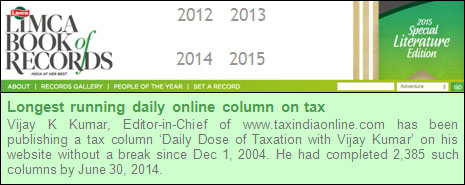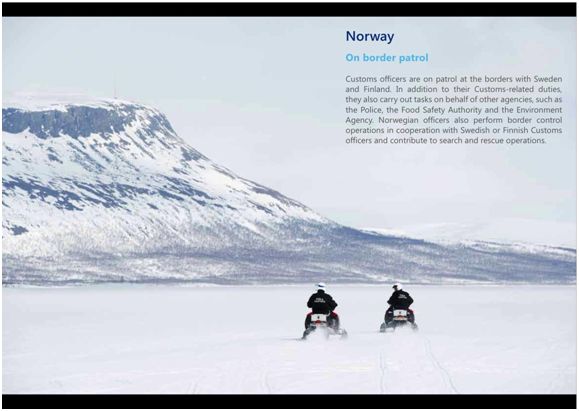CBDT Notifies new ITR Forms

24 06 2015
Wednesday
THE last time they notified the new ITR forms, it virtually created a storm and the Finance Minister on tour abroad had to announce that the Forms are withdrawn and new simplified forms would be notified. That was amendment to Rule 12 of the Income Tax Rules by Notification No. 41/2015, Dated 15-04-2015. See DDT 2579.
DDT 2580 20 04 2015 commented,
It seems the babus are out to defame the Modi Government. Just look at the information they want in the new Income Tax Returns they notified last week.
In the new Forms, assessees are required to give details of all the bank accounts (including closed ones) held by them any time during the year with the closing balance as on 31.3.2015. If an assessee has travelled abroad, he has to give details of his travel including the expenses for the travel. In trying to catch the black money hoarders, the Government is trying to harass the white money holders. Your bank account is not a secret, nor is your foreign travel. Most probably the Income Tax authorities already have that information. In any case what are they going to do with the mountain of information?
Now the CBDT has again amended Rule 12 to prescribe new Forms - SAHAJ (ITR-1), ITR-2, ITR-2A and SUGAM (ITR-4S)
The changes in the new forms are:
1. Details of dormant bank accounts need not be furnished.
2. Name of joint holder need not be given.
3. Account Balance as on 31st March of the previous year, need not be given
4. Details of foreign travel need not be given; however passport number has to be given.
5. Aadhaar Number has to be given.
A new Form ITR-2A has been notified for individuals or HUFs whose total income for the assessment year 2015-16 includes:-
(a) Income from Salary / Pension; or
(b) Income from House Property; or
(c) Income from Other Sources (including Winning from Lottery and Income from Race Horses).
This form cannot be filed by an individual or a Hindu Undivided Family whose total income for the assessment year 2015-16 includes,-
1. Income from Capital Gains; or
2. Income from Business or Profession; or
3. Any claim of relief/deduction under section 90, 90A or 91; or
4. Any resident having any asset (including financial interest in any entity) located outside India or signing authority in any account located outside India; or
5. Any resident having income from any source outside India.
Income Tax Notification No. 49/2015., Dated: June 22, 2015
FTP - DGFT Notifies Bank Guarantee Form for PSIA
DGFT has notified the new Bank Guarantee Format, to be executed with DGFT, for recognition as Pre-Shipment Inspection Agency (PSIA).
DGFT Public Notice No. 21/2015-2020, Dated: June 23, 2015
Service Tax Refund - Relevant Date - from Tribunal's order
HERE is an interesting case:
The assessee was registered for providing various financial services like hire purchase service, leasing service etc. under the category of banking and other financial service brought into service tax purview w.e.f. 16/07/2001. Proceedings were initiated against the assessee on the ground that they had not paid the entire amount of tax payable because they had not added certain charges collected by them. As a result of the proceedings, net service tax payable by them was worked out as Rs.12,59,368/- with interest and penalty was also imposed. Thereafter the matter reached the Tribunal and as per the Final Order reported in 2008-TIOL-397-CESTAT-BANG the Tribunal by its order dated 12.11.2007, held that the services rendered by the assessee fell under hire purchase finance scheme and not hire purchase scheme and therefore assessee was not liable to pay service tax.
Thereafter, the assessee filed a refund claim on 24.09.2008. The refund claim was rejected as hit by limitation as it was filed beyond the period of one year.
On an appeal filed by the assessee, Commissioner (Appeals) held that the assessee was eligible for the refund since they had filed the refund claim within one year from the date of passing of the Tribunal order and the payment of service tax from 2001 onwards can be viewed as without any authority of law. Accordingly Commissioner (Appeals) held that rejection of refund on the ground of limitation is not sustainable.
Revenue is in appeal against the impugned order allowing the refund.
The Tribunal observed,
In this case, proceedings were initiated by the Revenue on the ground that appellant was not paying service tax on the full value and were not including certain charges levied by them. The adjudicating authority confirmed the demand of service tax amounting to Rs.30,95,926/- out of which he appropriated the amount of Rs.18,36,558/- already paid by the assessee. From the proceedings initiated resulting in the OIO, it is seen that the Department had reopened the assessment for the entire period from 2001 onwards.
Ultimately, the service itself was held not liable to tax at all.
Having reopened the assessment in its entirety, demanding the entire amount of tax payable and appropriating whatever already has been paid, the net result is that the Departmental officers have reopened the entire assessment and therefore the refund claim filed by the assessee after the Final Order was passed by this Tribunal holding that no tax was liable to be paid, has to be considered as one arising as a result of the Tribunal order and therefore the time limit cannot be accounted from the date of payment of tax.
Under the circumstances, it has to be held that claim of limitation by the Revenue cannot be accepted.
Accordingly the appeal filed by the Revenue is rejected.
Please see 2015-TIOL-1225-CESTAT-BANG
Customs - Poor Trade Facilitation - CAG Comments
THE CAG recently submitted a report to Parliament on the Performance of Import and Export Trade Facilitation through Customs Ports.
Audit observed,
The Indian economy is one of the fastest growing economies among the emerging markets today. One important cause is the rapid growth in international trade. In order to sustain the current pace of export growth in a highly competitive global market, there is a need to reduce the associated costs.
Trade Facilitation is aimed at ensuring the movement and clearance of goods across borders at the minimum cost. It is a term used to denote all steps for simplification of procedures and reduction of costs in the course of international trade. Reduction in idle time in any segment of the trading process would reduce transaction costs and would facilitate trade in general and enhance the price competitiveness of Indian goods in international market. Delays increase not only the cost of compliance but also lead to impediments to efficient trading across borders like congestion at the ports.
As a measure of trade promotion, trade facilitation has come to occupy a significant place in the multilateral discussions on trade in the recent past due to the importance given by the international community in liberalizing trade.
Over the years, the Department of Revenue (DoR) had initiated various trade facilitation measures like simplification of rules and procedures, IT initiatives, e-governance, Accredited Client Programme (ACP), 24x7 clearance facility, Authorised Economic Operator (AEO) Programme etc.
The objective of this performance audit was to assess the adequacy of regulatory framework, policy implementation, operational issues and internal controls.
Audit found:
Lack of uniformity in customs operations:
A foreign vessel calling Chennai and then calling Cochin is not permitted to carry even empty containers from Chennai to Cochin even though cabotage has been relaxed for Cochin, while on the reverse leg containers from Cochin are accepted in Chennai. The reason furnished by the department was the lack of provision in the ICEGATE portal to handle such movements.
Department of Revenue (DoR) in their reply (January 2015) stated that a module has been provided in ICES 1.5 for trans-shipment of import cargo from a Seaport to another Seaport on 7 February 2014.
Since the audit observation was raised after February 2014, DoR was advised to review its status.
Examination of Export goods at the factory premises: Why this facility is not used?
After the receipt of goods in the dock, the Customs Officer on the basis of the checklist and other declarations filed by the exporter in the Service Centre may inspect/examine the shipment. The customs officers mark the SBs and also hand over the original documents to the Dock Appraiser who assigns a customs officer for examination. The system selects the packages to be examined and also directs whether the goods require a NOC/Certificate from the outside agency.
Audit observed that in eight Commissionerates, during the period 2010-11 to 2013-14, examination of the cargo in 32 per cent of SBs filed took more than 24 hours.
Examination of goods predominantly takes place at CFSs and involves unpacking of the goods resulting in delay and at times loss of goods. Despite an option for the exporters for getting the goods examined by Central Excise officers at their factory premises, as a facilitation measure, the quantum of SBs examined at the factory was only 37 per cent which is low leading to unnecessary time lag.
DoR in their reply (January 2015) stated that reasons for not utilizing the facility of examination at the factory premises by exporters are not ascertainable. CBEC on its part has decided, inter alia, that a single factory stuffing permission is sufficient for all the customs locations. Also, a circular dated 22.07.2010 has been issued that any request for factory stuffing by exporter/manufacturer communicated through e-mail to Central Excise Authority should be considered for scheduling for factory stuffing by Central Excise authorities.
Audit is of the opinion that necessary coordination and monitoring may be required to implement the said facilitation procedure.
Recommendation : Department may examine and address the reasons for non-utilization of the facility of examination at the factory premises, by the exporters.
Permanent Trade Facilitation Committee:
As per Board's circular dated 25 October 2013, Permanent Trade Facilitation Committees (PTFCs) established at each Custom House as a trade facilitation measure was to meet regularly with minimum of one meeting each per month on a pre-decided date aimed at encouraging stakeholder participation and expeditious resolution of local issues (without these being escalated to the Department/Board).
Audit observed from the data provided by ten Customs Commissionerates that in five Customs Commissionerates monthly meetings were held during the period 2010-11 to 2013-14, whereas in two Customs Commissionerates the meeting was held only on a quarterly basis. In Custom House, Amritsar, the first PTFC meeting was held in May 2014.
WCO Photo Competition 2015 - Norway Entry - Border Patrol

Until Tomorrow with more DDT
Have a nice day.
Mail your comments to vijaywrite@tiol.in

















